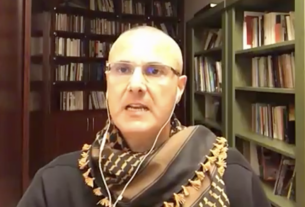It is still impossible to predict how artificial intelligence (AI) will affect our lives, according to Itai Margalit, area vice president for Salesforce Israel.
The company, founded in a basement in 1999, is celebrating its 25th anniversary—and its bar mitzvah (13 years)—in Israel, but Margalit said Salesforce isn’t “resting for a moment. We keep on investing in technologies, and AI is a significant part of that. I think we still do not realize the boundaries and where AI will take us.”
Margalit spoke by Zoom to The Jerusalem Post last week. He discussed the company he joined two and a half years ago and why he believes AI is the future. He said AI will impact our work and our personal lives.
“The impact of AI is going to be so massive,” Margalit said. But he warned that “its potential to touch many things could also bring challenges. It could be, I would even dare to say, dangerous.”
Margalit stressed the need to use AI responsibly and the importance of implementing safeguards to ensure that AI is used for positive purposes and to minimize potential adverse outcomes as much as possible.
“The technology world is moving so fast. What we do today in six months would have taken us a few years a decade ago,” he said. “It’s an era of exponential growth, and I cannot tell you what will happen in a year.”
Margalit holds a pivotal role as part of the elite team spearheading this technological advancement.
Salesforce is a global enterprise leader in customer relationship management (CRM). Founded 25 years ago, it recently reported $34.9 billion in revenue, making it the number-one CRM company worldwide and the most significant enterprise application company worldwide.
The Israeli branch
The Israeli branch was founded in 2011 with the acquisition of the Israeli startup Navajo Systems and is now one of the company’s top three R&D hubs—alongside the US and India. Salesforce has acquired around a dozen Israeli companies, including Blue Tail in 2012, Kransen in 2015, Implicit in 2016, Datorama in 2018, Bonobo and Clicksoftware in 2019. Today, the local team of 750 employees focuses on AI: AI-powered big-data marketing intelligence, AI analytics and voice technology, security and field service solutions.
“We’re taking innovation very, very seriously,” Margalit told the Post. We are committed to at least three updates on our versions per year, and this is something that we do across all our platforms and product lines. It has served us very nicely because it ensures that we are not resting for one second when it comes to our products and that we are using the latest technology.”
Margalit joined Salesforce after a lengthy career in other high-tech companies, where he used Salesforce for his work. Since joining and seeing the company from the inside, he said, “I couldn’t be happier about the decision to join.”
The company is built on values, including trust, customer success and innovation. Margalit said that since October 7, he has seen those values come into action more than ever.
“We have a principle called 111,” Margalit said. “Today, I am very happy that more than 20,000 companies worldwide follow this principle. But the first one that came out is Salesforce when it was founded.”
The principle is simple: 1% of our profits in real cash, 1% of our time with our employees, and 1% of our product are being contributed to any cause that makes sense to us—civilian causes.
“It is very easy to say something like that when you’re a startup in a garage. But when you’re a $35 billion company, think about it means: hundreds of millions of dollars every year, and this is where we are today.”
When the Hamas massacre happened, Salesforce took action to help. The company has been flexible and supportive of its staff, many of whom serve in the army reserves. In addition, it contributed more than $3 million to nonprofits to help support those impacted by the war.
“We put a huge amount of time of our employees and our product into contributing to many nonprofit, civilian organizations, supporting the people that have been evacuated from their homes and many other things,” Margalit said. “Being personally a part of this, I couldn’t be happier working for a company that allows me and our people” to give back.




